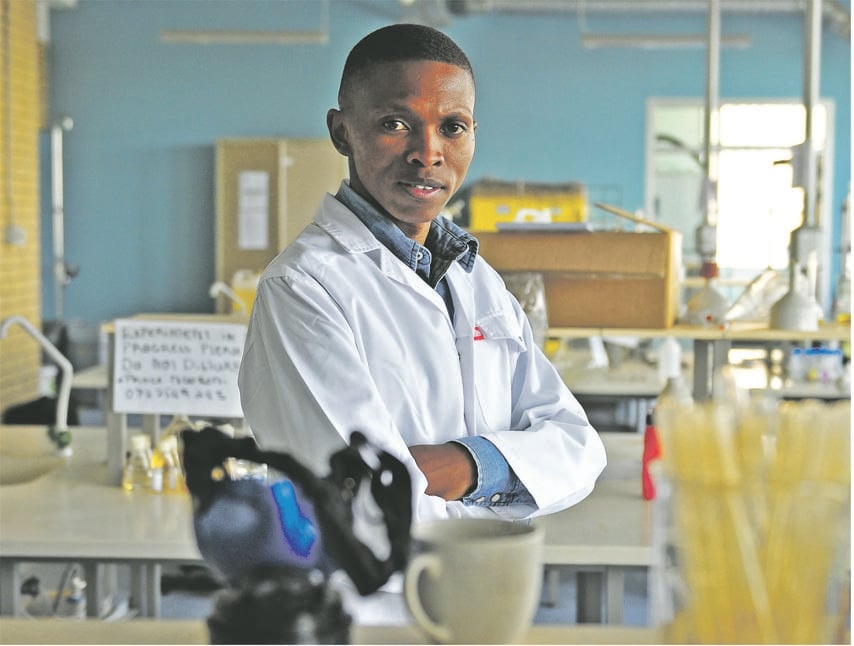
A chance discovery of castor seeds while walking home from church is behind what might be a ground-breaking idea of creating biofuel from castor seed.
Thabang Mabapa is a self-confessed curious social entrepreneur who might just have a viable alternative to the country’s current fuel price crisis.
He makes biofuel from castor oil extracted from castor trees and its growing demand is proving to be a disruptor in the commercial farming community.
City Press met up with the Soweto-born innovator at his workplace, a laboratory at Wits University.
He is wearing a lab coat and it’s difficult to believe he is neither a qualified scientist nor a registered student of science.
“I was on my way to church and a friend of mine gave me tree spikes to throw away. I didn’t know what they were at the time. I put them in my bag but when I got home I got curious and started crushing them and I found the seeds inside,” says the PR graduate of the life-changing encounter in 2013.
He shows City Press a picture on his cellphone of the tree spikes and, to a layperson, they look like weeds that are not useful for anything.
Mabapa started researching the seeds and approached academics. The first to respond was Wits University.
“I found out they have castor oil content and I approached Dr Nkazi – who is now my technical mentor – and he told me I should extract the oil myself so that he could see I was serious. He just said I must be innovative and find a way.”
Dr Diakanua Nkazi is a senior lecturer in the School of Chemical and Metallurgical Engineering at Wits.
Frustrated by lacking the scientific know-how of extraction, Mabapa headed to his mother’s kitchen, boiled the seeds and crushed them with a spoon.
After handing over the unrefined oil to Nkazi, he visited his relatives in Limpopo.
“I bumped into an old man who saw me holding the seeds. He asked me what I was doing with the seeds since they are not grown in the country any more and the company that used to grow them closed down in the 1970s.
“I explained to him that I was considering growing them. So we approached the chief who gave us two hectares of land on which to grow the seeds.
“Luckily Ntate Phiri, who used to work at the farms before they closed down, knows how to grow them well so he showed me,” he says.
Mabapa admits that, at the time, what he had in mind was mere castor oil which would still be a commercially viable product.
When he returned to Wits, Nkazi asked him what he wanted to do with the oil and encouraged him to look at alternative uses.
“So I did some research and found that we can also use the castor oil as feed stock.
During that period, though he was still enrolled as a PR and communications student at the University of Johannesburg, he spent a lot of time at the laboratory at Wits.
“I just focused on biofuel and that is my project, nothing else, and over time our product line expanded to biojet fuel and biogasoline and all this time we got more land for castor seed farming in North West, Mpumalanga and the Eastern Cape,” he says.
By the end of 2015, he had fully tested the oil and diesel and was open for business to the public.
“We sell mainly to small-scale farmers and they buy because they see us using it in our tractors at the farm.”
He points out that biodiesel is carbon-neutral and so does not absorb or emit any net output of carbon dioxide and it’s good for a vehicle’s engine.
Mabapa said he was fortunate that the department of science and technology and a few other sponsors offered support for the research and development, which is still underway for the bio-jet fuel product line.
“When we sell our biodiesel and castor oil, some of the revenue is dedicated to research to make sure the bio-jet fuel and bio-gasoline will also be sold commercially at some point,” he says.
Mabapa adds there are currently talks with some companies who want to buy regularly.
In his company Selokong Sa Dimelana (SSD), there are currently four engineers and 25 farmworkers and none of the farms is owned, but rather leased.
He said his business model accommodates partnerships with people who own land and, as a result, he is forming partnerships across the country with farm owners to grow the seeds.
“We are always the custodians of the land that is farmed. We don’t want the land; it should be given to the locals and we will do business with them so that the value remains in the communities,” he said.
Mabapa said the plan was to increase capacity and eventually own a biofuel refinery.
In 2016, the budding scientist won Spark International’s (South Africa) 2016 Changemaker of the year, while SSD was named among the top 10 Total Startups of the year.
He is also one of the Red Bull Amaphiko Academy social entrepreneurs, having been hand-picked from the top 16 in the country to attend their in-house course, and benefit from a one-on-one mentorship programme.
 |
| ||||||||||||
| |||||||||||||




 Publications
Publications
 Partners
Partners








